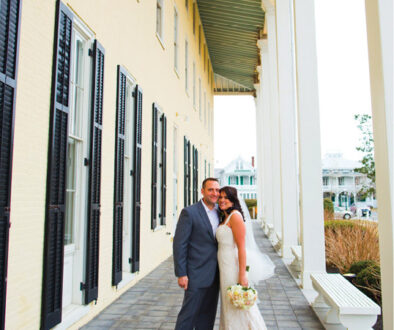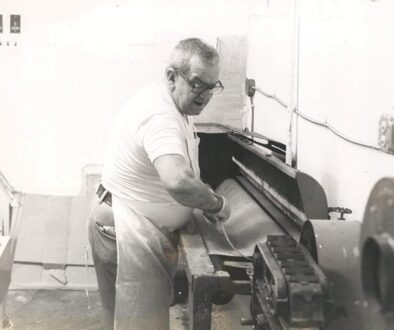The Coast Guard’s Hometown
On a chilly Friday morning in late April, bright sun streamed through the windows of the spacious gymnasium on the grounds of the U.S. Coast Guard’s training center as Captain Todd Prestidge rose to address the latest crop of recruits to complete their eight-week boot camp. Having entered as raw recruits, some of whom may not have anticipated the rigors of the training they’d signed up for, within days the 36 men and six women would be winging their way to Coast Guard facilities across the country. But today Prestidge wanted them to remember where it all started. “This is Cape May!” he boomed. “This is your new home town!”
For casual and part-time visitors to Cape May, intent on enjoying its beaches, Victorian architecture, and fine restaurants, the Coast Guard base can be almost invisible. Perhaps they hear the faint echoes of the national anthem and military music from the center’s loudspeakers each morning and at lights-out. They might notice neat ranks of recruits chanting and jogging in step through city streets now and then. And, of course, when more advanced recruits get a rare day of leave, they can be spotted in small groups at Wawa, along the promenade, or in Rio Grande’s shopping area—erect, exceedingly polite, and always in uniform.
But the relationship between the Coast Guard’s training center—TRACEN, in military lingo—the city of Cape May, and the broader Cape May community is far more complex and runs much deeper. Sixty-seven years after the Coast Guard established itself in Cape May in 1948, TRACEN and Cape May have built an enduring partnership. And it’s one that received its formal seal of approval in May, with the designation of Cape May County as an official “Coast Guard community.” Years in the making, that designation was marked by a May 8 proclamation ceremony, followed by a weekend-long public celebration, with walking and trolley tours, live music, children’s activities, interactive exhibits, a beer-and-BBQ bash, a gala dinner, and plenty of political speechmaking.
“It celebrates Americana,” says Prestidge later, speaking in an armchair in his office. With a firm handshake, a confident bearing, and a shaved head atop his muscular frame, Prestidge has served as TRACEN’s commanding officer since 2013. He’s quick to sing Cape May’s praises. “The relationship between Cape May and the Coast Guard celebrates everything that’s special about the area, from Wildwood and the doo-wop days to Cape May as one of America’s first resorts. We’re proud to be part of that, and I can’t think of another place where I’d rather send new recruits out into the world.”
If Cape May is the adopted hometown for thousands of new recruits every year, it’s also the Coast Guard’s hometown, too. A web of ties binds Cape May to the Coast Guard, from the popular sunset parades to the participation of TRACEN’s color guard units at Fourth of July, Memorial Day, and other events year-round. Ed Mahaney, Cape May’s mayor, says that Coast Guard personnel play an important role in the community. “They attend our churches and sing in church choirs, they coach our Little League teams, they get involved in civic activities of all kinds,” he says. “They volunteer to help out with our music festivals, at Harborfest, in our parades. If we had to run all of our festivals and special weekends year round without them, well, we couldn’t do it.”
Several years ago, Mahaney and Captain William G. Kelly, then TRACEN’s commanding officer, began serious discussion of having Cape May win designation as an official Coast Guard community. By then, 14 other cities had already earned that distinction, beginning with Grand Haven, Michigan, in 1998. (Since then, two others have joined their ranks.) “Kelly was surprised, and I was surprised, that Cape May wasn’t already included,” says Mahaney.
The city began the process of applying, which requires expansive documentation of a community’s Coast Guard ties, and which must be approved by the Coast Guard and both houses of Congress before it’s a done deal. Soon Mahaney was joined by Bill Morey, a newly elected freeholder, and they agreed to expand the application to include not just the city but the entire county. Backed by Vicki T. Clark, the president of the county Chamber of Commerce, Mahaney and Morey began recruiting politicians and business and civic leaders to support the effort, and they established a county-wide committee to oversee it all.
To learn how it all works, Morey flew out to Grand Haven, which calls itself “Coast Guard City, USA.” Says Morey, “We had as our focus that, number one, we don’t want to repeat what they’ve done, but we wanted to learn from their experience.” At first, Morey says, he looked at the Coast Guard from the standpoint of its economic impact on Cape May. “But I quickly found out how important the social aspect is.” For instance, he points out, plenty of Coast Guard personnel find spouses in Cape May, and many end up retiring here, too, after their service.
One of those driving the process to certify Cape May as a Coast Guard community herself has intimate ties with the Coast Guard. Vicki Clark’s father-in-law, Sam Clark, was a career Coast Guard member who served with the Guard in Vietnam, and her sister-in-law is married to a career Coastie. And, years ago, her husband made a surprise oceanside marriage proposal on the Coast Guard beach in Cape May, hiding the ring inside an Italian hoagie.
Clark had little trouble getting local businesses to take part in the designation effort, and letters poured in endorsing the campaign from businesses and civic groups, from the New Jersey State Chamber of Commerce to the Cape May Nature Center and local churches—along with resolutions in favor from 17 municipalities in Cape May County.
At least part of the reason that businessfolk backed the campaign was because having the designation could cement the Coast Guard’s presence in Cape May for many years to come. “Having this designation is critically important to making sure that base stays here,” says Clark. “It’ll work in our favor should there be any chance in the future of the base closing.”
Twenty years ago, that came perilously close to happening. Twice, remembers Mayor Mahaney, in 1995 and again in 1997, the Coast Guard threatened to close its Cape May facility, part of the post-Cold War budget cutting and retrenchment that led to the shutdown of scores of military bases around the nation. “The Coast Guard set up a commission and hired a consulting firm called Tetra Tech to look at whether or not to maintain, consolidate, or close the base,” Mahaney says, and Tetra Tech recommended doing so. However, a tidal wave of support from businesses, civic groups and citizens culminated in a packed meeting at the Grand Hotel’s ballroom on Pearl Harbor Day in 1997 that began at 4pm and ran into the early morning hours, with 700 people in attendance. The Coast Guard stayed put.

One who’s stayed put in Cape May is Tom Carroll, a retired Coast Guard officer who, with his wife, Sue, owned the Mainstay Inn from 1977 until 2004. The Carrolls themselves have become mainstays in Cape May, including as patrons of and volunteers at the Mid-Atlantic Center for the Arts and Humanities. But, like many other Coasties who’ve retired in the Cape May area, Carroll hasn’t forgotten his Coast Guard roots. After going to the service’s Officers Candidate School in 1969 and serving on active duty until 1971, Carroll joined the Coast Guard reserves and served as the commanding officer of Cape May reserve activities, retiring with the rank of captain. “When I was there we had 60 to 80 reservists in Cape May who helped with everything from search and rescue to boating safety,” he says.
Carroll points out the many ways that members of the Cape May community engage with TRACEN: There’s Operation Fireside—a Red Cross-run program under which more than 180 families host upwards of 500 Coast Guard recruits in their homes on Thanksgiving and Christmas. There’s the Coast Guard Family Assistance Fund, which helps bring friends and family of graduating recruits to Cape May every week, often paying plane fares and, in cooperation with local hotels and motels, arranging free or reduced-rate stays. And there’s the Coast Guard auxiliary, which has 199 members in Cape May County, an all-volunteer, civilian program that the Coast Guard calls a force-multiplier. “Anybody can join,” says Carroll. “It’s the only volunteer service like that for any branch of the military.”
One leader of the Coast Guard auxiliary in Cape May, dubbed Flotilla 8-2, is Joe Giannattasio. “The auxiliary in south Jersey is among the oldest and largest in the country,” says Giannattasio, who owns the Milky Way Ice Cream and Mini-Golf in Villas. “Our members do pretty much every mission there is.” Besides conducting tours of TRACEN, assisting in recruit training, going to sea on missions from aid-to-navigation efforts to boat checks, members of the auxiliary help prepare, cook and serve meals for members of each graduating class and their families. “We don’t get paid,” he adds.
From the reserves to the auxiliary to local businesses and Operation Fireside, hundreds of Cape May area residents are engaged with TRACEN. Tracey Martin, who works for Cape Resorts, is a long-time resident of Cape May whose grandfather was a career Coast Guardsman, and her family hosted recruits as part of Operation Fireside when she was in school—back at a time when, she says, some school kids would say, “Don’t make friends with Coast Guard kids, because they’ll just leave.” Now, with a family of her own, Martin hosts recruits every year. “It’s part of our holiday,” she says. “And it feels special to be able to do something for the [recruits].” Each holiday, she visits TRACEN and comes home with a few young men and women who, she says, are gratified to get a home-cooked meal and a chance to call relatives, jump on a computer, or take a nap.
By the numbers, it’s hard to exaggerate the importance of TRACEN to Cape May’s economy, too. The base is the largest employer in the county, supporting 700 year-round jobs for military and civilian personnel and an additional 150 contractors from Cape May and surrounding communities who work on the base. On top of that, TRACEN hosts up to 500 recruits at any one time. According to a 2013 economic impact study by Atlantic Cape Community College, the base itself, including TRACEN and 11 other Coast Guard commands headquartered there generates $173 million a year in direct and indirect spending. Among other impacts, at least 40,000 people a year visit Cape May to attend their son or daughter’s graduation ceremony—staying in local hotels and motels, eating at local restaurants, buying souvenirs. “If you go to C-View Inn on any Friday night, you’re likely to see four or five Coast Guard families eating there,” says John Cooke, the manager of the Victorian Motel on Perry Street.
Cooke, who serves as the Cape May Chamber of Commerce liaison to the Coast Guard, works closely with the Family Assistance Fund to make sure that families can get to their son or daughter’s ceremony. The fund also maintains a web site so that families of each graduating company can network and get to know each other before they arrive in Cape May, says Cooke. “And we’ll work with Cape May hotels to get deeply discounted or, in some cases, free rooms for them when they get here.” The day that Cape May Magazine caught up with Cooke, twenty people were booked into the Victorian Motel for the next day’s ceremony.
The 40,000-strong U.S. Coast Guard replenishes its ranks every year with up to 3,500 graduates of TRACEN’s boot camp. Except for men and women who go to the Coast Guard Academy along the Thames River in New London, Connecticut, every single member of the Coast Guard passes through Cape May. At the ceremony for Zulu 190, the company of recruits who graduated in late April, Captain Prestidge told the 500 people packed into the gym—led by cheering relatives—that the kids they sent to Cape May aren’t the same anymore.
“They have changed,” he said. “They’ve lost a little weight. Their hair is different. They will stand up straight. They will look you in the eye. We took what you gave us, which in some cases wasn’t much”—laughter at this—“and we turned them into Coast Guardsmen.”
Captain Bill Kelly, the former commanding officer of TRACEN—who rose to Rear Admiral in May—looks back fondly on his tenure in Cape May, where he lived through frozen winters and storms Irene and Sandy. “The people who came there in the summer didn’t have a clue about the Coast Guard base, but when you get to know the residents who are part of the community, the support from the auxiliarists, the people from the community who help us, well, that was neat.”
And Kelly agrees with Prestidge that Cape May is the Coast Guard’s hometown. “Eighty percent of all Coast Guardsmen come through Cape May,” he says. “That’s their birthplace. That is where Coast Guard careers all start. And what they learn in Cape May will stay with them.”












